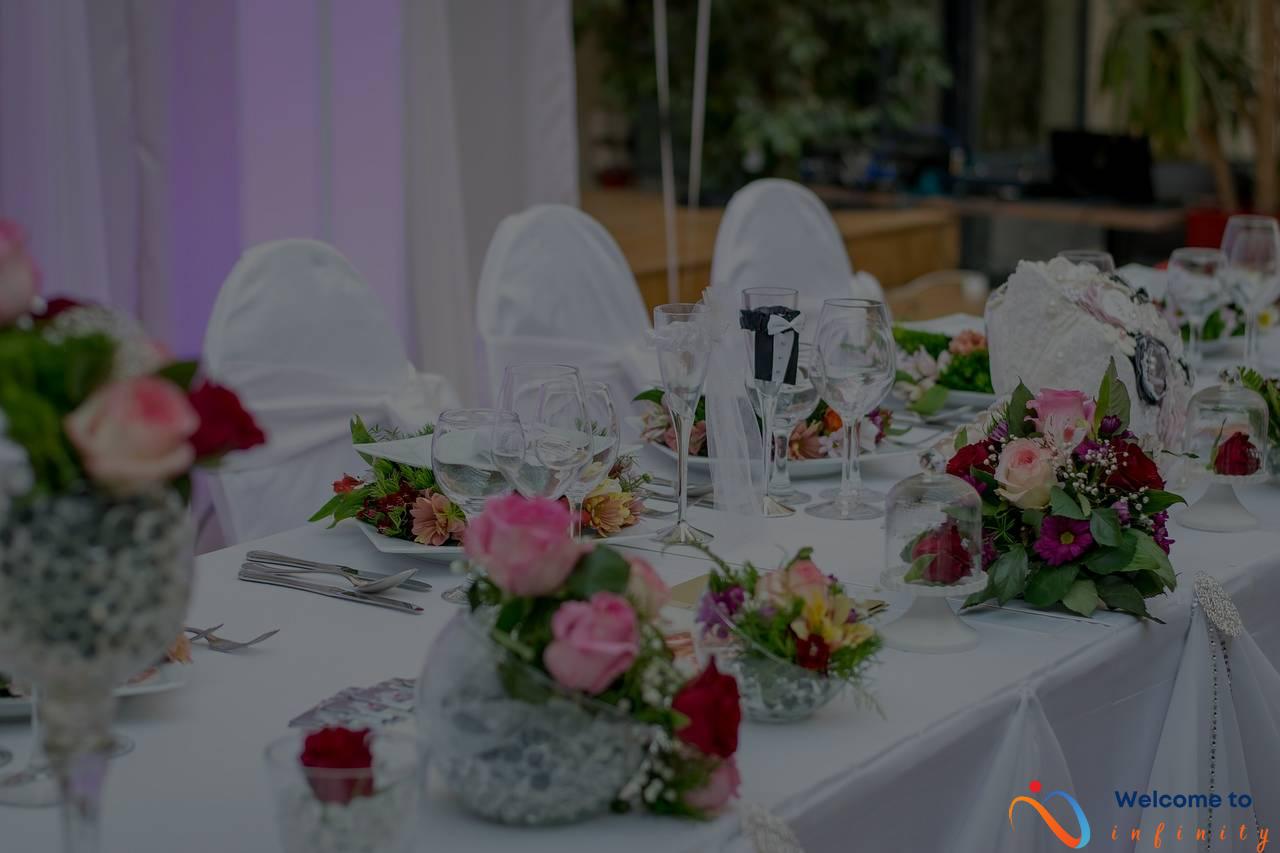Choosing the right music for your wedding ceremony is an important part of creating the perfect ambiance for this memorable occasion. However, the complexity of the process, coupled with the numerous options available, can make it seem daunting. Fortunately, this guide is here to help.
Whether you're feeling overwhelmed by the choices or you're unsure where to start, this ultimate guide to wedding ceremony music selection will provide you with the insights and tips you need to make the process easier and more enjoyable. From choosing the perfect type of music to personalizing your selection and handling the logistics, we've got you covered.
With this guide by your side, you can create a memorable wedding ceremony that reflects your personalities and preferences, and ensures that your guests have a wonderful time. So let's dive in and explore everything you need to know about selecting the perfect music for your special day.
Choosing the Right Type of Music
Music is an essential element of any wedding ceremony. It can be used to create a warm and romantic atmosphere, or to make the ceremony exciting and upbeat. The first step in selecting the right type of music is to determine what genre or style resonates most with you and your partner.
Here are some popular music genres for wedding ceremonies:
- Classical: Classical music is a timeless and elegant option that creates a regal and sophisticated ambiance.
- Contemporary: Contemporary music is a modern and trendy choice that can add personality and uniqueness to your ceremony.
- Something in Between: If you want something that combines classic and contemporary styles, you can opt for something in between, like jazz, folk, or indie music.
When selecting your music, it's important to consider the tone you want to set for your ceremony. Will it be a formal and traditional affair, or a laid-back and relaxed celebration?
By choosing the right type of music, you can create an atmosphere that reflects your personality and style as a couple. So take your time and carefully consider the options available to find the perfect music to complement the vision you have for your special day.
Instrumental vs. Vocal Music
When it comes to selecting music for your wedding ceremony, deciding between instrumental and vocal music is an important decision. Both types of music have their pros and cons, so it's crucial to consider your personal preferences and the overall vibe of your wedding.
Instrumental music can set a romantic and calming atmosphere, making it a popular choice for weddings. It typically includes instruments such as a piano, guitar, harp, or violin. Instrumental music can be versatile and flexible, making it easy to match with different parts of your ceremony. Additionally, it's often less distracting than vocal music, which can help keep the focus on the couple and the ceremony itself. On the other hand, instrumental music can sometimes be considered “background” music and may not be as engaging for some guests.
Vocal music can add emotion and depth to your ceremony and is often a more traditional choice. It can be a meaningful way to express your feelings for one another and add a personal touch to your special day. Vocal music can range from solo performances to group harmonies and can fit a wide variety of genres. However, vocal music can often be more distracting and may not be as versatile as instrumental music, which can limit its use during different parts of the ceremony.
Ultimately, the decision between instrumental and vocal music comes down to personal preference, so it's important to consider what you value most for your wedding ceremony. You may even choose to incorporate a mix of both types of music to create a unique and memorable experience for you and your guests.
The Role of the Wedding Party
The wedding party plays a crucial role in your ceremony and each part requires different types of music. To set the tone for the ceremony, the processional music should be slower and more formal. This music will accompany the entrance of the wedding party, including the bridesmaids, groomsmen, and the ring bearer. Here, you can choose soothing classical music or romantic contemporary music.
Once the wedding party has taken their places, it's time to play music for the bridal entrance. This music should be romantic and memorable to make the bride's entrance unforgettable. You can choose from classical pieces like “Canon in D” or contemporary hits like “Marry Me” by Train.
The recessional music should be energetic and celebratory since it accompanies the exit of the newlyweds. This is a time to celebrate, so the music should reflect this mood. You can choose upbeat music like “You Are the Best Thing” by Ray LaMontagne or “I Choose You” by Sara Bareilles.
With these guidelines in mind, you can select the perfect music for each part of your wedding party. Don't be afraid to get creative and add personal touches to make your ceremony even more special.
The Bridal Entrance
The bridal entrance is a moment when all eyes are on the bride. Choosing the perfect song to accompany this special moment is essential to creating an unforgettable experience for you and your guests. To make this decision easier, consider the style of the wedding, the bride's personality, and the emotions that you want to convey.
For a traditional and elegant bridal entrance, classical music such as Pachelbel's Canon in D or Wagner's Bridal Chorus (Here Comes the Bride) can set the tone. If you want to add a contemporary touch, modern love songs like A Thousand Years by Christina Perri or Perfect by Ed Sheeran can be a great choice.
Another factor to consider is the bride's personality. If you are a fan of a specific genre, like jazz or country, you may want to choose a song that reflects your taste. Moreover, the lyrics of the song can be a great opportunity to express your feelings and love for your partner.
It's essential to work closely with your musicians or DJ to ensure that the song's timing matches the bride's pace. You want to avoid rushing down the aisle or walking too slowly, which can create an awkward moment. You can also consider adding additional elements, such as a flower petal toss or special lighting, to enhance the bride's entrance.
In conclusion, the bridal entrance is a moment that you and your guests will remember forever. Consider the style of the wedding, the bride's personality, and emotions that you want to convey when selecting the perfect song. Working closely with your musicians or DJ to ensure the timing is right can help create a magical experience.
The Recessional
When it comes to choosing music for the recessional, there are a few things to keep in mind. First and foremost, it should be a joyful and upbeat song that celebrates the fact that you and your partner are now officially married!
Some popular choices for the recessional include:
- “Wedding March” by Felix Mendelssohn
- “Trumpet Voluntary” by Jeremiah Clarke
- “Hornpipe” from Water Music by George Frideric Handel
- “Ode to Joy” by Ludwig van Beethoven
Of course, you're not limited to classical music. If you want something more modern or unique, go for it! Just make sure that it's a song that you love and that will get your guests excited.
When it comes to timing, the recessional should be timed so that the music ends just as you and your partner reach the end of the aisle. This ensures that the song ends on a high note and that you have a triumphant exit.
If you're having a live band or DJ, be sure to communicate the timing with them so that they know when to start and end the song. If you're using recorded music, practice walking down the aisle to ensure that you have the timing down pat.
Overall, the recessional is a fun and celebratory part of the wedding ceremony. By choosing the right music and timing it perfectly, you can ensure that it's a memorable moment for both you and your guests.
Customizing Your Ceremony Music
One way to personalize your ceremony music is to choose songs that hold a special meaning for you and your partner. Think about songs that symbolize important milestones in your relationship or that have lyrics that reflect your love for each other.
Another option is to have your favorite songs arranged in a unique way. For example, you could have a string quartet play a rendition of your favorite rock song, or a pianist play an instrumental version of a pop ballad.
You can also choose to have a friend or family member perform during your ceremony. Whether it's a solo vocal performance or a guitar duet, having someone close to you perform can make your ceremony more intimate and personal.
If you have a specific theme or color scheme for your wedding, you can choose music that complements it. For example, if you're having a beach wedding, you may want to choose music with a tropical or seaside vibe.
Finally, you can customize your ceremony music by including cultural or religious traditions that are significant to you and your partner. This could mean incorporating traditional wedding songs or hymns, or choosing songs that represent your cultural heritage.
The possibilities for customizing your ceremony music are endless, so don't be afraid to get creative and make your music choices truly unique to your relationship and your special day.
The Logistics of Wedding Ceremony Music
Now that you've chosen the perfect music for your wedding ceremony, it's time to consider the logistics. One critical factor to keep in mind is the equipment needed to play the music. Be sure to confirm that the venue has the required audio equipment or, if you've hired musicians, they have their own equipment. If not, you may need to rent or purchase the necessary equipment.
Timing is another important consideration. You'll need to coordinate the timing of each song with your wedding planner or the officiant to ensure that the music flows seamlessly throughout the ceremony. To avoid awkward pauses, make sure that the length of the music fits properly with each component of the ceremony.
In addition to timing, consider the necessary transitions between songs. For example, you may want to fade out the instrumental music before switching to a vocal piece. These minor details can make a significant impact on how well the music complements your ceremony's ambiance.
If you have any special equipment needs, such as microphones or an audio mixer, make sure to communicate them early so that the equipment can be set up correctly before the ceremony. Planning ahead can help prevent any mishaps and ensure that the day goes smoothly.
Finally, don't forget to discuss the logistics with your DJ or musicians before the ceremony. They'll be able to provide guidance on how to set up the equipment, ensure proper timing, and give you peace of mind that everything is under control.
Hiring Musicians
If you're opting for live music for your wedding ceremony, hiring musicians can be a process in itself. Here are some tips to make the hiring process run smoothly:
- Research: Do your research and find reputable musicians or bands that specialize in wedding ceremonies. You can ask for recommendations from family and friends or search online for reviews and testimonials.
- Set a budget: Determine how much you're willing to spend on musicians, and be upfront about it when inquiring with potential candidates. This will save you time in the long run.
- Audition: Before booking a musician or band, schedule an audition to ensure they can perform the music you want and that their style aligns with your vision for the ceremony.
- Contracts: Always sign a contract with your hired musicians. This contract should include all details of the agreement such as the date, time, payment, and specific songs to be performed.
- Communicate: Keep communication with the musicians leading up to the wedding. Discuss any changes or updates to the program, and make sure they have the necessary equipment and space for the performance.
Hiring musicians can add a special touch to your wedding ceremony. Follow these guidelines to hire the perfect musicians for your big day.
Using Recorded Music
If you're looking for a budget-friendly option for your wedding ceremony music, pre-recorded music is a great choice. One of the benefits of using recorded music is that you have complete control over the playlist, and you don't have to worry about any last-minute changes or mistakes. Here are some tips to keep in mind when using recorded music:
- Test the equipment: Before the ceremony begins, make sure to test the speakers and microphones to ensure that everything is working properly. It's also a good idea to have a backup option, such as a portable speaker, just in case.
- Create a playlist: Spend some time creating a playlist that fits the tone and ambiance of your wedding. Choose songs that are meaningful to you as a couple and that your guests will enjoy.
- Assign a person to manage the music: Designate someone to be in charge of the music during the ceremony. They should be responsible for starting and stopping the songs at the appropriate times.
- Consider the timing: You'll want to make sure that the music is timed correctly to match the different parts of the ceremony, such as the processional and recessional. Have a clear idea of when each song should begin and end.
Overall, using recorded music is a convenient and cost-effective option for your wedding ceremony. By following these tips, you can ensure that your music runs smoothly and adds to the overall atmosphere of your special day.
Conclusion
Choosing the perfect music for your wedding ceremony is a crucial component in creating a memorable and special day. It can seem overwhelming, but with the guidance provided in this ultimate guide to wedding ceremony music selection, you're well on your way to making informed decisions. Whether you opt for classical, contemporary, instrumental, or vocal music, this guide has provided you with options to make your day truly unique.
Remember to consider the logistics of your music selections. If you opt for live music, this guide has provided valuable advice on how to hire musicians for your ceremony. If you choose to use recorded music, there are tips on how to play pre-recorded music at your wedding without sacrificing quality.
The right music will set the tone for the entire day, and this guide has provided guidance on how to select the perfect songs for each part of your ceremony to enhance the experience for you and your guests. It's important to customize your music selections to add a personal touch and make your special day even more memorable.
By following the tips and insights in this guide, you're well on your way to making informed decisions that will enhance your wedding ceremony experience and create a day that you, your spouse, and your guests will never forget. Congratulations on your upcoming nuptials, and have fun selecting the perfect music for your wedding ceremony!












